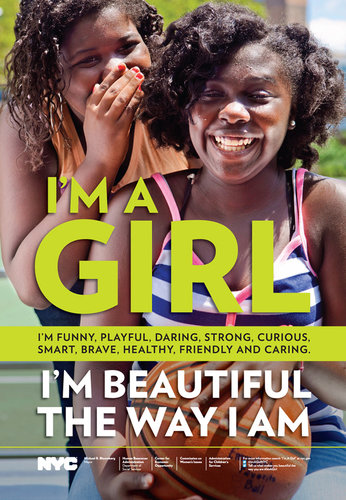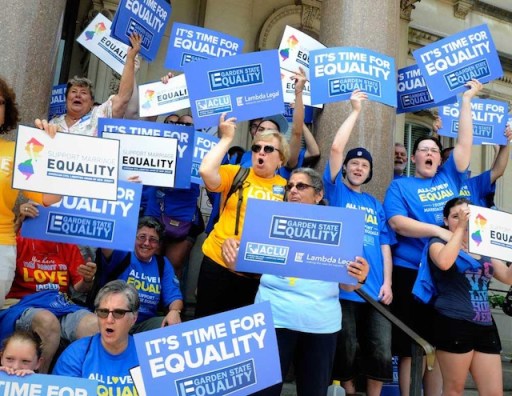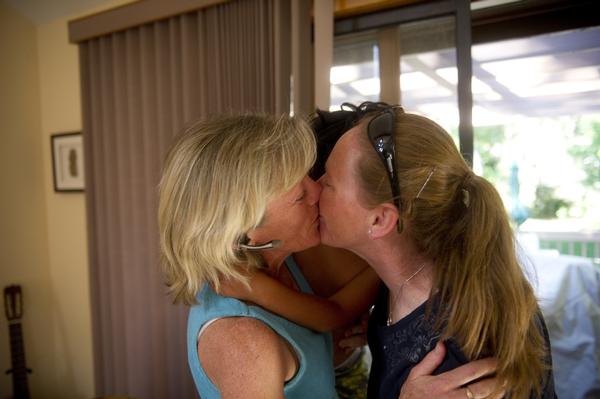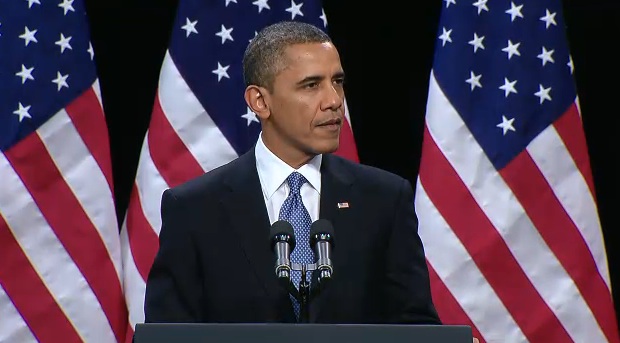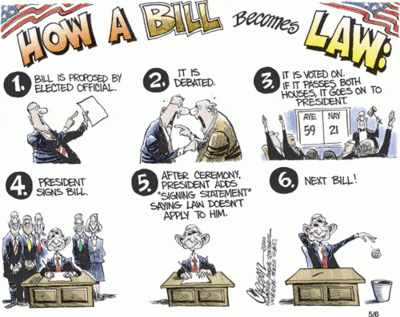Edith Windsor, Lesbian Trailblazer Who Changed Your Life, Has Died
Edith Windsor kept a thank you note from a 9-year-old named Grace, who’d written to thank her for making it possible for her parents to marry. She showed it to a reporter from Time Magazine who came to interview her in 2013, and also on her wall she had a framed picture from Alison Bechdel, also expressing thanks for “paving the way.” They called her an “unlikely activist,” Edie Windsor, who radiated with magnetic charm, and who died today, in Manhattan, at the age of 88. Her second wife, Judith Kasen-Windsor, who she married in 2016, has not specified a cause of death.
Edith Windsor, whose parents came to the U.S from Russia when she was a little girl, read voraciously, and kept forever the 19-volume dictionary her father used to learn English. When Edith Windsor was 13, she was elected vice president of her eighth-grade class. Edith Windsor’s mother told her that if anybody at school called her a “dirty Jew,” she should pull their hair.
She told the reporter from Time Magazine that once upon a time she’d seen a lesbian couple dancing at a gay bar and thought to herself, “I hope I have that when I’m old.”
Edith Windsor met the love of her life, Thea Spyer, at a restaurant named Portofino, in Greenwich Village. She’d asked her friend, “if you know where the lesbians are, please take me,” and so her friend took her. Thea was a psychologist. Edith was a computer programmer. Maybe you know this already, maybe you’ve seen the documentary.
When Edith and Thea were engaged, Thea wore a circular diamond pin instead of a ring, so people wouldn’t ask too many questions and expose them. They couldn’t be out, not then. There were some places where they could be out, certain homes and bars and vacation towns. But nothing like it is today.

Women like Edie Windsor and quite notably Edie Windsor herself created change, fighting for things many young gays take for granted, that later generations won’t really understand how we ever lived without. She lived a double life; she had to. Nothing like it is today — like could she have ever imagined that on the day of her death, a social media application called Twitter would turn into a virtual collage of selfies various LGBTQ people had taken with Edie Windsor, and their memories of her?
In 2012, Edith Windsor went to court, challenging the federal Defense of Marriage Act, protesting that she was asked to pay $363,000 in estate taxes when Thea died because the federal government did not recognize their marriage. They’d been together for 44 years. “It’s just a terrible injustice, and I don’t expect that from my country. I think it’s a mistake that has to get corrected,” Edie told NPR.
In 2012, a judge in Windsor’s case ruled that Section 3 of DOMA was unconstitutional, and the case then went on to the Supreme Court. In 2013, the Supreme Court issued a 5-4 decision also declaring Section 3 of DOMA to be unconstitutional and enshrining that fact as federal law. Same-sex married couples were granted federal recognition and earned access to myriad federal benefits. State laws banning same-sex marriage around the nation remained in place until another Supreme Court decision in 2015.
Thea Spyer, Edith’s wife, had been kicked out of Sarah Lawrence for kissing a woman — which is funny to imagine, I mean, it’s Sarah Lawrence. Thea was intentionally “playing the field” when she met Edie at the restaurant but life comes at you fast, doesn’t it?
After dinner, Edith and Thea went to a party. At the party, they danced all night.
Obama’s State Of The Union Respects Women, Wants You To Have More Money
In his fifth State of the Union address Tuesday night, President Barack Obama set the tone for a year of strength from his office. Executive power, rather than legislative, is clearly the president’s intention for 2014. He told us again and again how he would, wherever possible, bypass the gridlocked Congress to enact change, even delivering a presidential order to raise the minimum wage for federal workers to $10.10. He announced intentions to close the prison at Guantanamo Bay by the end of the year. He called out those (mostly Republican) politicians who made 2013 the year of gridlock, fear and grandstanding, rather than progress and cooperative action he called for in his last SOTU address. He laid out a few key issues he plans to address with or without Congress’s help, including early education, job creation, the gender pay gap and healthcare, promising ” a breakthrough year for America.” You can read the full text of the speech here and watch the video below.
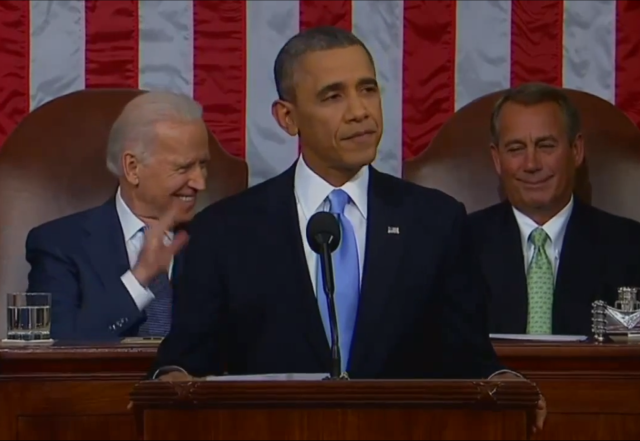
Screenshot via The New York Times video
If all goes according to his plan (and it very well may not) this will be a year of leaps and bounds for many of the Americans who felt left behind in 2013. Women, people of color and those living in poverty all received direct attention in this speech, to name a few. The president specifically called out income inequality, following through on an earlier executive order to change the minimum wage for federal workers to $10.10 and calling on Congress to work with Democratic senators’ plan to set the nationwide minimum to the same amount. That Senate proposal, by the way, would lift millions of Americans out of poverty. Obama also called for the reinstatement of unemployment insurance benefits that expired last month, leaving families whose members lose their jobs suddenly without one of the best proven lifelines. He announced a new plan to help Americans create public retirement savings accounts that could help ease the retirement crisis. “The cold, hard fact is that even in the midst of recovery, too many Americans are working more than ever just to get by – let alone get ahead,” he said. To help us get ahead, he’s pledged to give us whatever tools are possible without legislative action.
Women were a huge focus of the night, from discussions of healthcare to workplace inequality to business growth. Early education, technology innovation, booming industry, medical insurance — they pretty much all came back to women who, whether they work or raise families or devote themselves to something else altogether, deserve to be backed by the rest of the nation. He featured as many female guests as males among his personal anecdotes, and even generic examples of progress like referencing “an entrepreneur [who] flipped on the lights in her tech startup” emphasized female strength throughout the country. And given recent confusion over what we mean when we talk about the “war on women,” the president’s insistence that women are people fully deserving of the same opportunities as men was a good reminder that not all our politicians are against us. It shouldn’t be a bold move, but it certainly felt like one.

Image via ThinkProgress
As for healthcare, Obama’s biggest political effort so far was an opportunity both to chide his opponents for attempting dozens of repeals of the act and to plug the fledgling system with the group he thinks most likely to use it: young Americans. “Kids, call your mom and walk her through the application,” he said. “It will give her some peace of mind – plus, she’ll appreciate hearing from you.” The battle over Obamacare is not over, but maybe some politicians will follow in the president’s example in focusing on actionable issues with the system, like the website or confusion over keeping existing plans, rather than trying to repeal the law for the 41st time.
There was one thing that bothered me throughout the address and continues to irk me now as I look back at the transcript. So many of the important issues Obama called out, including gender, immigration, unemployment and healthcare, intersect with queerness in very powerful ways. We’ve written about how workplace discrimination, joblessness, homelessness, violence and more hit LGBTQ Americans, who often the lack familial support or monetary resources to get by until their luck changes, particularly hard. Recognition of that fact by the president of our nation, particularly in the speech meant to set the coming year’s priorities, would have leant so much heft to efforts to combat those issues. Even a celebration of the year’s various victories, like the gutting of the Defense of Marriage Act, the death of California’s Prop 8, the securing of marriage equality in seven new states and unprecedented progress for a more inclusive Employment Nondiscrimination Act, would have been an appreciated nod to the particular struggles of a subset of Americans. It would have cemented the support he’s verbalized on many previous occasions.
As in all things, however, we must look not only at what has been said, but also at what may be done. After a year of frustration, it was refreshing to see the president reminding us what he could do without our ever-gridlocked legislative bodies. He actually looked fresher and more energetic than he did during much of what has been called the weakest year of his presidency. He made promises to combat inequality by improving the resources available to those at the bottom of the wealth ladder, even if those at the top refuse to relinquish their surplus. He reminded us again and again that women aren’t just a subset of American society but rather a central component of it. He reaffirmed his promise to military families that he wouldn’t send their soldier out to fight in any more never-ending wars. He called on the nation’s leaders to set aside endless partisan battles and “say what we’re for, not just what we’re against.” If the president is able to do even half of the things he has promised, we’ll be a great deal further along in the right direction.
https://www.youtube.com/watch?v=hed1nP9X7pI&
Queer View Mirror: Five Important News Topics We Talked About in 2013
There’s a post going around Tumblr right now that pretty accurately sums up how I feel about this year. It’s one of those unformatted, semi-snarky text posts clearly designed to get a lot of notes, but I can’t deny identifying with the sentiment: “2013 was my character development year which means 2014 is strictly action and story progression and i dont know about you but i’m excited.”
That’s also how I feel about much of the work that was done in various queer communities this year: There was a lot of development and organizing and education and campaigning and so, so much important vocalizing of needs. We may not have gotten everything accomplished that we wanted to, but in many spheres, from reproductive rights to same-sex marriage to conversion therapy to trans* visibility, we’ve set the stage for real, concrete change in 2014.
I thought it would be a good exercise for this first edition of my weekly news column, Queer View Mirror, to reflect on some of the biggest things that happened in 2013 — what we were talking about, good and bad, for the last 12 months, and what we can reasonably expect to hear a lot more about in 2014. After this, QVM will be a recap of a single topic that’s been in the news that week, including historical background and some more forward-thinking stuff. But for now, let’s talk character development!
1. DOMA Dies, Everyone Puts a Ring On It
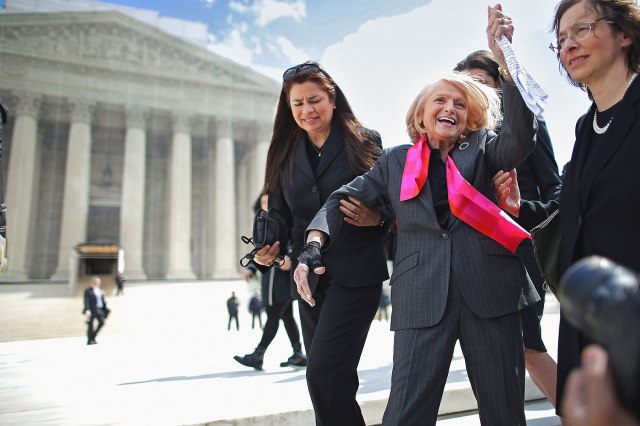
Windsor outside the Supreme Court when it heard oral arguments in March 2013. Via Chip Somodevilla / Getty Images.
When my home state of Illinois was considering legalizing same-sex marriage in May, it would have been the tenth state to do so. By the time it finally did in November, it was the fifteenth. Adding New Mexico and Utah, which both legalized marriage via court ruling this month, makes eight U.S. states where same-sex couples can get married today that couldn’t one year ago. Marriage is definitely not the be-all, end-all of equality for LGBTQ people, but for many, it is a legal status critical to protecting their families. For others, it’s simply something they want to do, and barring them from it is becoming increasingly legally indefensible. There’s also something to be said for how legalized discrimination — and the lack thereof — impacts public perception of said group.
The impetus behind legalization in many states has been the collapse of the Defense of Marriage Act, the federal act prohibiting same-sex unions, which was defeated largely by this June’s Supreme Court ruling in the case of Windsor v. United States. We’ve written quite a bit about the story of Edie Windsor and her wife Thea Spyer, who upon her death left Windsor a large inheritance that was promptly taxed by the government, which did not recognize their legal marriage. Windsor’s subsequent challenge of discrimination made it all the way to the Supreme Court, which effectively gutted the law when it ruled that using DOMA to bar same-sex couples from federal benefits and protections is unconstitutional. Many state courts have taken the ruling as reason enough to invalidate their own laws barring same-sex marriage, and even where appeals are pending (as in Utah, where a judge has ruled marriages may continue while the state makes its case), marriage equality advocates are hopeful. Though all polls should be taken with a grain of salt, it is encouraging that a number of surveys this year found for the first time a majority of support for same-sex marriage among Americans, and it seems judges and politicians are finally beginning to follow suit.
2. LGBTQ Groups Demand Rights Worldwide
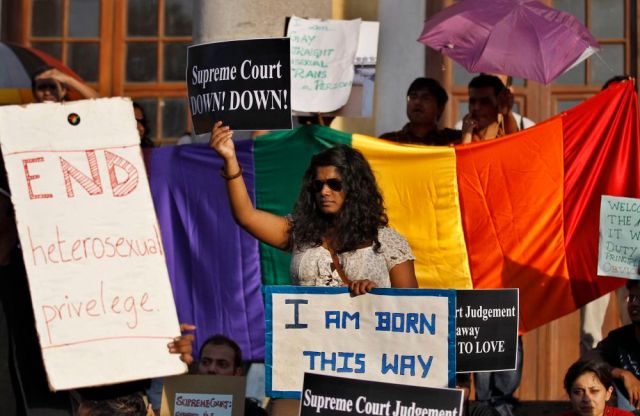
Gay rights activists in Bangalore, India, hold placards during a protest meeting after the country’s top Indian court ruled that a colonial-era law criminalizing homosexuality will remain in effect in the country. AP Photo/Aijaz Rahi
Marriage battles have broken out across the rest of the world, too, and they’ve often been just as erratic abroad as in the U.S. In July, Queen Elizabeth II approved a bill to legalize same-sex marriage in England and Wales, but not the rest of the United Kingdom. Costa Rica’s legislature accidentally passed a bill legalizing same-sex unions, but so far courts have declined to enforce it as such. In Australia, a High Court decision this month invalidated a piece of legislation from October that had legalized same-sex marriage in the Australian Capital Territory. Unlike in the U.S., where couples who marry during brief periods of legalization have been allowed to stay married after the laws are challenged, Australian couples who married during the last two months have been stripped of their licenses. Blargh. France legalized marriage equality after an outbreak of antigay attacks and expressions of homophobia, though many couples have found it still doesn’t protect their unions. But sure victories have been won in Brazil, New Zealand, Uruguay, Colombia and France.
But marriage isn’t the only right LGBTQ people have to fight for, and in many places the much more basic right to exist without fear of attack or harassment is still unsecured — and in most cases, these situations are direct results of current or former western and western colonialist influences. In Uganda, for example, a long-debated bill punishing homosexuality with life imprisonment has passed; a similarly draconian law in Nigeria was rubber-stamped this month and now awaits only a presidential signature. India’s Supreme Court overturned a 2009 law decriminalizing homosexuality, infuriating those in the country who had hoped the original legislation would be a stepping stone to greater security, recognition, and legal rights. In South Africa, where LGBTQ equality was written into the constitution but still struggles for societal support, the death of Nelson Mandela combined with mounting antigay stances among politicians has many activists worried that violence against queer people — particularly “corrective rape” of lesbians, a disturbing trend in the country — will soon increase.
In other ways, though, solid gains have been made. Ireland got an anti-bullying measure for its LGBTQ schoolkids, a French lesbian couple won the right to adopt children together and South and Southeast Asia saw queer visibility skyrocket. Trans* people are coming out and getting more acceptance in some areas, and countries like Germany and Australia allowing people avoid male or female labels on some official documents. A couple of places saw their first-ever pride celebrations, including Gujarat, India, and Podgorica, Montenegro. Serbia held its third annual pride parade despite an official ban on doing so.
3. Visibility Increases for Trans* People, But Doesn’t End Violence Against Trans* Women

Trans* people, and women especially, have made a mark on the public sphere this year, whether through representation on popular television shows or through horrifying cases of assault and mistreatment in the justice system. Though not everyone is doing it right (many are getting it really, really wrong) some media outlets are trying harder to properly address trans* people in their coverage of these events. Laverne Cox and CeCe McDonald both made my list of top queer women of 2013, and commenters on that story pointed out a handful of other trans* women who could have easily joined them, including Chelsea Manning, Janet Mock and Laura Jane Grace. Some young trans* people are demanding and winning legal protections in schools, and parents are creating more safe spaces for their gender nonconforming children. Even in countries where anti-trans* sentiment is strong, trans* communities are growing and speaking out against violence. Everywhere you look, trans* individuals are demanding recognition, and not as the demeaning caricatures they’ve long been associated with.
But these are baby steps — important baby steps, but baby steps. The pressure is on to guide those new to representing trans* folk — I’m looking at you, Two And A Half Men — are doing it in a respectful, informed way. But still, shows like Glee and movies like Dallas Buyer’s Club, which consider themselves allies to trans* folks and are lauded as such, are failing miserably to offer positive and constructive portraits of trans* life or to include trans* folks in the development or execution of their work. In this way, trans* media representation is presently not dissimilar to where gay and lesbian media representation was at in the ’80s.
I’ve seen people like Cox and Mock and our own Autostraddle writers who have made sure that at least some of the discussions going on about trans* people are done with care as well as a critical eye. Still, there is a lot of ground left to cover, particularly when it comes to stopping anti-trans violence and making the LGBTQ rights movement as inclusive as its acronym suggests.
Trans* women, especially trans* women of color, still face terrifying amounts of violence, and little chance of seeing justice for their attackers. The murders of women like Islan Nettles, Domonique Newburn, Brittany Stergis, Betty Skinner, Amari Hill, Eyricka Morgan, Kelly Young, Ashley Sinclair, Cemia Dove, Diamond Williams, and many more show us that in some ways, the most important takeaway when it comes to trans* issues in 2013 may be how far we still have to go. Charges against Nettles’ murderer were recently dropped, and many of these murders aren’t being classified as hate crimes; it’s clear that as a culture we have a lot more work to do in making sure trans women and trans women of color are safe, and for the legal system to hold someone accountable when they’re not. This was the year that saw increased outrage over trans* women’s mistreatment in prisons, but not a solution to their problems. And that should be the goal for next year — to take all this knowledge and anger and turn it into concrete change.
4. Sochi Olympics Could Be the Best or Worst Thing to Happen to Gays in Russia

The Olympics are headed to Sochi, Russia in 2014, and, given the country’s dangerous and repressive laws against gay “propaganda”, the world isn’t sure what to do about it. President Barack Obama is skipping the Olympics but sending LGBTQ Americans in his place. Gays are boycotting Russian vodka (although the impact of this move is up for debate). International celebrities are facing sanction to wave rainbow flags during trips to the country. Many are calling for a complete boycott, similar to the 1936 Berlin games. Athletes are coming out in droves and assuring the world they’ll compete in Sochi anyway. Still, Russia is cementing its stance as a homophobe’s heaven by passing laws. In the meantime, Russia’s laws have spurred horrific attacks against gay teens (who, uhh, don’t deserve protecting, apparently). There has been some hope that the government is softening its anti-gay stance, but then everyone started second-guessing that as a political tactic to make the Olympics a success. Until we hear more discussion (and more solid commitments) from Russian leaders, it’s hard to say what the best tactic is going into the games.
5. Everybody Comes Out

Coming out is a double-edged sword for most of us; for celebrities or people otherwise in the larger spotlight, it is even more loaded. Regardless, the backlash to coming out has changed radically. 2013 was a big year of coming out for politicians, actors, journalists, athletes, musicians, television and comic book characters, scientists and many, many more. Elsewhere, debate erupted on why we come out, when we should do it, what we say when we do and what it means if we don’t. Regardless of why or how we come out, though, doing so is an important personal and political act. It asserts our right to exist, reminds those who oppose us that we aren’t going anywhere. And if 2013 felt like we found a new fellow queer a day, I can’t wait to see what 2014 brings.
And that’s it! Well, it’s not everything, of course, but we’ll dive into more after the new year. For now, go pick out your best sparkly outfit, buy some champagne, and get ready to party. We made it through 2013! See you next year.
Queer View Mirror is a weekly news recap focusing on one topic per week. (Except this first one, which covers the whole year.) I’ll take you through the history of the topic, the most current events and where to go to learn more. Use what you read here to write a research paper, be a better blogger or impress people at parties. Or as an excuse to never read the newspaper again. You do you. If there’s something in particular you want to hear about, email kaitlyn@autostraddle.com and let me know!
Edie Windsor Recognized On Time’s Person of the Year Short List
This morning, Time announced its Person of the Year. Considering the many ups and downs of 2013 – so many wins! so many more frustrating almost-wins! – it was no surprise to see two figures prominently associated with LGBT rights included on the short list: Pope Francis, winning the official “Person of the Year” title, and lesbian activist Edie Windsor taking second runner up.
First, briefly, the ever controversial Pope Francis.

Thousands turn out in Rome to greet Francis during his biweekly audiences. Via Francesco Zizola / NOOR for TIME
In the profile of Pope Francis, Time highlights his connection to LGBT rights,
The five words that have come to define both the promise and the limits of Francis’ papacy came in the form of a question: “Who am I to judge?” That was his answer when asked about homosexuality by a reporter in July. Many assumed Francis, with those words, was changing church doctrine. Instead, he was merely changing its tone, searching for a pragmatic path to reach the faithful who had been repelled by their church or its emphasis on strict dos and don’ts. … In short, ease up on the hot-button issues. That might not seem like significant progress in the U.S. and other developed nations. But the Pope’s sensitivity to sexual orientation has a different impact in many developing countries, where homophobia is institutionalized, widespread and sanctioned.
This seems appropriate. While Pope Francis has been breaking new ground within the tradition of Catholic leadership, it’s important to note that he has not (yet) changed any official doctrine. Only time will tell how this shakes out.
Moving on.
In Eliza Gray‘s profile of Edie Windsor, Time describes Windsor as an “unlikely activist” who slowly but steadily grew into the role of “matriarch of the gay-rights movement.” Chronicling the 84 year-old’s long journey to acceptance, the article lovingly describes Windsor’s secret girlhood crushes, her proposal to longtime partner Thea Spyer (done with a diamond brooch because an engagement ring would have been too risky), the first time she came out to coworkers (done the night before a biannual conference for computer programmers on the West Coast), and, eventually, her life as an out lesbian activist.
Windsor made national headlines in 2010 when she sued the government for a $363,053 refund of estate taxes she had to pay upon her spouse’s death. After a long legal battle, on June 26, 2013, the Supreme Court decided 5-4 in Windsor’s favor, overturning DOMA and federally recognizing same sex marriage for the very first time.

Windsor outside the Supreme Court when it heard oral arguments in March 2013. Via Chip Somodevilla / Getty Images.
Windsor released a statement today, saying,
I am honored that Time chose me as one of the number 3 individuals in the top 5 nominees for ‘Person of the Year,’ but I am just one person who was part of the extraordinary and on-going fight for marriage equality for all our families. There are thousands of people who helped us come this far and we still have a lot more work to do. The gay community is my ‘person of the year’ and I look forward to continuing to fight for equal rights and educate the public about our lives alongside my gay brothers and sisters and our allies.
Other candidates making Time’s short list included document leaker Edward Snowden at number two, Syrian President Bashar Assad at four, and anti-gay GOP neanderthal Ted Cruz at number five.
Also.Also.Also: The Empowerment of Goddesses, Twenty-Somethings, and NYC Girls and Other Stories We Missed This Week
Hello, onions and shallots! As I wrote this I was in Intern Grace’s living room in Ohio, which I think is a sign that this week is ending on a strong note. Here’s the stories we missed this week while I was out and about in Columbus, Ohio!
Sh*t That Is V, V Real
+ Prism magazine thinks having a commitment to ending discrimination based on sexual orientation and preaching the value of ex-gay therapy are somehow or at all synonymous! What an amazing bout of absolute fuckery.

Ads by Taproot India
+ The anti-DV campaign featuring ‘abused goddesses’ is not without its flaws.
+ Queer Pakistan (the website) is no longer a thing, thanks to the local government in the region. The catch? You can still see it if you’re not in Pakistan.
+ Two Brazilian women were arrested for making out. That’s commitment.
+ The Nuestras Raices Delaware paegant for girls is investigating the ethnicity of a competitor because she’s a black Latina, and they don’t think those are real.
+ Microsoft chose to introduce the Xbox One with some lighthearted transphobia. I will respond as I’ve always responded by reveling in how unfixably unfashionable Microsoft will always be.
+ Out of the closets, into the streets, but definitely not on screen: the Gay True Hollywood Story.
+ If the New Yorker profile on he-who-shall-not-be-named (Bryan Golberg, ew) made you want to claw out your eyes, you’re gonna wanna read the response from The Riveter.
The real inquisition, we think, should be directed toward you, The New Yorker editors. AfterBryan’s blog faceplant wherein he inspired gaggles of sarcastic articles and Twitter disses, why publish this article, which accentuates how asinine the genesis and concept of Bustle is (see: Lizzie’s “infinite-monkey theorem” and Bryan’s enthusiastic reaction to the term “bustle:” “A guy who’s successful, busy, cool, and popular – people would say he’s a real hustler… A woman who’s successful, busy, living in a city – maybe she’s a bustler!”)? Not only does this article make Bryan seem like, well, “a giant six-year-old,” but also it disempowers women’s publishing by default. Is this all we have to look forward to?
On the question of why: We are also wondering why you chose to publish an article about a high-profile man who has already raised 6.5 million dollars for his cause and spend 9 precious pages painting the “giant six-year-old” picture? Bad press is still press. We think – quite modestly, we must add – that those 9 pages could have been better spent on organizations and startups that are actually doing something to address and change the misconceptions of gender in the magazine industry.
But we are just two women in our twenties.
I Been Wronged, I Been Down, To The Bottom of Every Website
This is how you remind me why I’m not a Nickelback or a breakup fan.

Show Me The Money
The government owes married same-sex couples some serious cash. Time to take that shit to the bank.
The Defense of Marriage Act, or DOMA, defined marriage as between a man and a woman, which meant married same-sex couples had to file their taxes individually. But the Supreme Court’s summer ruling overturned that law. Now these couples are not only able to file as married going forward, but they have the option of amending their tax returns for the past three years if it would benefit them…
Refunds will vary widely by couple, and could be as high as tens of thousands of dollars. Janet and Janet Emery-Black, from Nampa, Idaho, are anticipating retroactive refunds totaling $30,000. Another couple, Adele and Jennifer Hoppe-House, from Los Angeles, expect to get back $13,000.
You Should Give
+ Dyke Central TV: Dyke Central is a homegrown, independent Oakland-based queer series. The “funny drama” ultra low-budget pilot episode brought in almost 700 YouTube subscribers and 800+ Facebook fans. This fall, we’re shooting four more episodes, and we need the support of our current and future fans to do so. Dyke Central centers around 30-something butch roommates Alex and Gin. The first season sees Alex attempting to sustain her dysfunctional relationship with girlfriend Jackie, in the face of new life options and the resurfacing of an old flame. Gin, on the other hand, is a chameleon whose identity changes with every new interest and tends to lose herself in others. Surrounded by a diverse group of friends who guide, challenge and support them, Alex and Gin struggle to adapt to change and create balance in their lives without losing themselves.
https://www.youtube.com/watch?v=vLwtNUlNsVM&feature=player_embedded#t=4
+ MAJOR!, A Documentary: Miss Major Griffin-Gracy is a Black transgender woman, a formerly incarcerated person, a former sex worker, an elder, a community leader, and an internationally-recognized human rights activist. From the 1969 Stonewall Rebellion to her current work as Executive Director of the Transgender GenderVariant Intersex Justice Project (TGIJP), she’s worked tirelessly for transgender rights for over 40 years. Miss Major has rallied in front of government officials and spoken around the world, but her most enduring legacy has been uniquely personal. She’s been the emergency phone call, the helping hand, and the surrogate mother to an entire community of transgender women whom she’s supported, mentored, and helped mold into the next generation of community leaders.
You Should Go
The Polari film festival is queer as fuck and right around the corner! Check it out in Austin October 16-20.
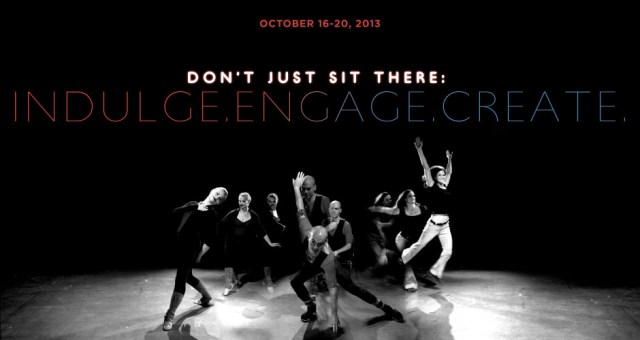
You Go, Girl
New York City is taking on girls’ empowerment:
Mr. Bloomberg is taking on the popular, unattainable notions of beauty promoted by professional image-makers with a campaign that tells girls that they are beautiful the way they are.
Mainly through bus and subway ads, the campaign aims to reach girls from about 7 to 12 years old, who are at risk of negative body images that can lead to eating disorders, drinking, acting out sexually, suicide and bullying. But unlike Mr. Bloomberg’s ads to combat teenage pregnancy, smoking and soda-drinking, which are often ugly, revolting or sad, these ads are uniformly upbeat and positive.
“I’m a girl. I’m funny, playful, daring, strong, curious, smart, brave, healthy, friendly and caring,” one ad, featuring DeVoray Wigfall, a robust, laughing 12-year-old from University Heights in the Bronx, says. The ads show girls of different races and sizes, some playing sports and one in a wheelchair. Each one ends with the campaign’s overall slogan: “I’m beautiful the way I am.”
Modern Gay (Rights)
The only thing left is gender anarchy.
It may be OK, soon, for a woman to marry a woman and a man to marry a man everywhere in the United States. But it’s not even close to being OK for a boy to like Barbies and sparkly pink dresses or to swish when he grows up—or for a girl to be so masculine that people nearly do a double take trying to figure out which sex she fits. It’s not OK, yet, for someone apparently born male to grow into womanhood, or for someone who started life considered female to make it clear he’s a man. As for the rest of us, we are still, far more than we understand, herded unnecessarily by our sex—by the stereotypes associated with how a woman or a man should act.
It needn’t be this way. And if we as a country make the right legal, cultural, political, and educational decisions in the years to come—if we are willing to listen to, and learn from, those on the gender margins—we can make more room for us all.
Hear Me Out…Or Not
How do you put a glass ceiling on a concert hall? Turns out it’s already there — and pretty damn hard to break.

Congrats, Dartmouth!
Queer housing is coming to Dartmouth! Dartmouth gays: may the party be with you.
New Jersey Ruling Calls for Legalizing Gay Marriage, Chris Christie Plans to Appeal Like A Total Jerk
A New Jersey judge ruled Friday morning that the state must follow in the federal government’s footsteps and recognize marriages between same-sex partners.
The suit filed by Garden State Equality points to the Supreme Court’s ruling in United States v. Windsor, the landmark decision that struck down the Defense of Marriage Act and officially recognizes same-sex marriages on a federal level. Currently, same-sex couples in New Jersey can enter into civil unions, and in 2006 the state’s top court ruled that those unions must be granted the same legal rights and protections as marriage. Now, Judge Mary Jacobsen has taken things one step further, ruling that barring same-sex couples from marriage is a violation of the New Jersey constitution. This is one of the mounting numbers of victories for equality and for gay families stemming directly from the repeal of DOMA, including stories like the fact that Jennifer Tobits was recently allowed to receive benefits from her late wife’s employer.
A spokesman for Governor Chris Christie stated shortly after the ruling was announced the governor plans to appeal the ruling, meaning there’s no certainty New Jersey couples will be signing licenses any time soon. Christie has opposed marriage equality in his state with increasingly nonsensical rhetoric for some time now; especially given his possibly aiming for a Presidential nomination in 2016, he may be very motivated to stop marriage equality in its tracks. He’s also in the middle of a race for re-election against Barbara Buono, who supports marriage equality and also has a gay daughter. Christie’s statement on the matter, delivered by his spokesman Michael Drewniak, was:
“Gov. Christie has always maintained that he would abide by the will of the voters on the issue of marriage equality and called for it to be on the ballot this Election Day… Since the legislature refused to allow the people to decide expeditiously, we will let the Supreme Court make this constitutional determination.”
In many ways, what’s happening in New Jersey feels reminiscent of Prop 8 — conservatives trying to stand in the way of marriage equality because it’s “the will of voters” and ignoring the constitution feels pretty familiar. But with DOMA’s repeal, the story might be very different this time. For now, this looks like it could be a victory — or at least a step in the right direction.
This Week In Small Post-DOMA Victories: Judge Rules that Lesbian Widow Should Receive Spouse’s Benefits
In Good News Since the DOMA Ruling, a Philadelphia judge ruled that the lesbian widow of a deceased lawyer is entitled to the proceeds of her wife’s benefits plan. After a long legal dispute with her wife’s parents, Jennifer Tobits will receive the $41,000 sum from the profit-sharing plan her wife held at her law firm.

District Judge C. Darnell Jones cited both the Supreme Court DOMA case and the recent ruling on US v. Windsor as influential factors in his decision. Jones wrote, “Windsor makes clear that where a state has recognized a marriage as valid… the U.S. Constitution requires that the federal laws and regulations of this country acknowledge that marriage.”
Tobits and Farley were married in Toronto in 2006 and celebrated their marriage in Illinois, where Farley worked for the prominent law firm Cozen O’Connor. Farley worked at the firm’s Chicago office, but the case was brought to Pennsylvania, where the firm is based. Though Pennsylvania does not recognize same-sex couples, Tobits’s lawyer believed they had a valid case based on the new federal law that confirms same-sex couples have the right to spousal benefits. Additionally, Cozen O’Connor’s death benefits plan defined spouse as someone married for at least a year.
According to the National Center for Lesbian Rights, after Farley died from cancer in 2010, her parents filed to take control of Farley’s estate, refusing to acknowledge her marriage to Tobits. With the help of the NCLR, Tobits petitioned that Illinois law did recognize their marriage, meaning that she should receive benefits as any surviving spouse would. In September 2012, Tobits did secure the rights to Farley’s estate, however, the Pennsylvania district court put the benefits plan case on hold as the Supreme Court was considering several cases regarding the constitutionality of DOMA.
As Judge Jones was quoted here, the state laws around the Employee Retirement Income Security Act are preempted by federal law. This will hopefully take precedence in future decisions where same-sex couples are unions are not recognized.
Whether this case will have an effect on Pennsylvania law or on future LGBT state-level legislation remains in question. But since the DOMA ruling, judges have increasingly credited the case in support of same-sex marriage rights. In a recent release, Tobits expressed her optimism after the ruling in her favor: “…it’s a great tribute to [my wife] that the courts have rejected these challenges to our marriage and recognized our commitment to each other and the life we built together.” As it becomes harder for employers across the US to deny benefits to same sex spouses, the legal backing for marriage equality across the nation builds.
Also.Also.Also: Trans* Women in Paris and Other Stories We Missed This Week
Hey, firecrackers! Let’s take a look at the stories we missed this week while my friends and family trolled my Facebook.
Are You Ready
Is NASCAR ready for a gay driver? Does anyone care?

ready for what
All Around the World, Gay Rights Crumble Just In Time For Me To Write About Them
Organisers say they are pleased with the turnout on Friday as more than 1,000 people took to the streets here to protest homosexuality and a proposal to legalize gay marriage in Haiti. The protesters carried anti-gay placards and chanted songs in which they threatened to burn down parliament if its members make same-sex marriage legal. A Haitian gay rights group has said it plans to submit a proposal allowing homosexuals to wed, but a coalition of religious groups said it opposed recent laws in other countries supporting gay marriage.
According to sources in Haiti, within the protest against marriage between persons of the same sex, individuals armed with knives (sticks, blocks and other objects) attacked several people.
https://www.youtube.com/watch?v=q-u126Q3gHA
+ In Mexico, an openly gay mayor.
+ In Britain, people who watch porn need to ‘fess up. Or else they’ll lose their ability to watch it forever. No but seriously, everyone in Britain may soon have to inform their Internet providers if they want to continue accessing porn.
Keep On Keep On Keep On Journaling Through The Night
“Emotional writing heals physical wounds.”

All In The Family
Kids aren’t impacted by their parents’ sexualities – they’re impacted by their parents, period.
A second study in as many weeks has found that adopted children are not impacted by the sexual orientation of their parents. Instead, what matters is how well parents support each other and how satisfied they are with the division of childcare labor.
Epic Wins
+ Rachel Jeantel will go to the HBCU of her choice, for free.
+ Ohio must legally recognize one of the most deeply moving gay love stories of all time, according to a federal judge.
Women Reading Things, Not Reading Things
Why are women deserting newspapers? Does it have to do with the shitty trend pieces written about our lives?

A Republicanism Round-Up
+ House Republicans have thrown in the towel on DOMA.
House Republicans have been using taxpayer funding to foot the $2.3 million dollar billto defend the Defense of Marriage Act in a number of cases…Now that the Court has overturned DOMA, the House is abandoning its defense in the other cases…Thus, the federal government will no longer be spending taxpayer money to defend discrimination against same-sex couples, though the money already spent — which could have actually helped people — is lost forever.
+ Ken Cuccinelli, candidate for Governor in Virginia and man who shares a last name with a really terrible person I knew once, wants to ban oral and anal sex (FOR THE CHILDREN, OF COURSE) and is a straight-up, unabashed, incredibly douchey, homophobic asshole. I assume for those of us who live in Virginia this election is a no-brainer, right.
Trans* Women In 1950’s Paris

Check Out the First Binational Lesbian Couple In America To Be Granted Green Card Approval
One of the biggest problems of DOMA was the inability for same-sex couples to sponsor one another for immigration purposes. It was so problematic that we even celebrated the small victory of being “low-priority” for deportation. Thankfully, with the Supreme Court’s decision to strike down DOMA, Secretary of Homeland Security Janet Napolitano has stated that effective immediately, same-sex couples are able to sponsor one another and apply for green cards.
Catriona Dowling and Cathy Davis of Boulder, Colorado have become the first same-sex couple to be granted a green card. The couple met while climbing the Himalayas, were legally married in Iowa last year and have three children together. Davis is from Dublin, Ireland, and due to DOMA, has been on a work visa to live in Boulder with her family.
With the end date of Davis’ visa near, the Dowling-Davis family was getting ready to move internationally to stay together. The day Napolitano released the statement, Dowling and Davis printed it out from their home computer and went to the U.S. Citizenship and Immigration Services Office to apply for Davis’ green card.
“They were extremely nice about it,” Dowling said. “And we were so excited… We have been in a constant state of instability,” Dowling said. A week after applying, they learned their application had been approved.
“The Department of Homeland Security is prepared to recognize the legally valid marriages of lesbian and gay couples even when they live in states that do not,” said Lawyer Lavi Soloway, co-founder of the DOMA Project, a legal initiative which has sought green card recognition in about 100 cases for same-sex couples. “By issuing a green card to Cathy Davis on the basis of her marriage to Catriona, the U.S. government is finally recognizing the inherent dignity of this family, and giving tangible meaning to Justice Kennedy’s ruling.”
Also.Also.Also: Happy Birthday, Pride Flag and Other Stories We Missed This Week
You guys I have off on July 4 AND July 5. This was the breaking news of my own life, but here’s the stories we missed this week while I wasn’t planning a BBQ.
Facebook Gets Proud
70% of Facebook users have a gay friend, (I think 70% of my Facebook friends are gay) which probably explains their new gay pride emoticon. And SPEAKING OF PRIDE, HAPPY BIRTHDAY PRIDE FLAG. YEAH, YOU. YOU, RAINBOW FLAG OVER THERE. HAPPY FUCKING BIRTHDAY.

Examples of The Government Actually Working / Being Great
+ The Department of Education will now collect data about anti-LGBT bullying.
On May 22, I was at the White House for a Harvey Milk Day event, accompanying a delegation of GLSEN student leaders and staff. As we waited for the program to begin, a senior official from the Department of Education came running over to one of our students, Liam Arne.
“I need to shake your hand,” he said.“Because of you, the Secretary of Education is adding LGBT students to one of the most important Department of Education data collection instruments. You asked in that meeting, and afterward he told us to get it done!” …
LGBT-inclusive data collection may seem like a wonky goal. But let me tell you, data drives decision-making, and what is measured is what is valued when it comes to government action. Liam, one of GLSEN’s amazing student leaders, secured a huge advance for LGBT youth nationwide.
+ Obama promoted LGBT rights, albeit quietly, on his most recent visit to Africa.
+ Meet the highest ranking gay person in the Department of Defense.
+ PAID SICK LEAVE IN NEW YORK! WOOOOO!
Colorlines and the Case of the Cute Queers
Tee headline of this article is “We’re Here, We’re Queer, And We Look Real Cute.” My work here is done.

Russell Brand Sucks
Surprise!!! Russell Brand is THE WORST.
Russell then continued to joke that he likes to make advances on all gay women – and will carry on until he has tested every relationship in the country.
He added: “I just do that with lesbians, like ‘come on, you’re not that lesbian. For heaven’s sake, you’re just being difficult now.’
“She’s [Clare Balding] in a happy relationship, isn’t she? I won’t rest, until every lesbian relationship in Britain has been disrupted by an unwelcome boorish Essex boy.”
May you never rest, sir.
Even More on DOMA
+ What does DOMA mean for elderly queers?
+ “Same Love” has been blowing up on the charts following the DOMA / Prop 8 victories, which makes Macklemore hella proud. Can we listen to “Same Love” now because it’s like my favorite song no lie.
+ The perfect gay marriage cover came from The New Yorker:

Classified: Queer Playwright Seeks Queer Filmmaker
I am seeking a lesbian- or queer-identified documentary filmmaker to work with on a project that will shoot in late-summer/early-fall of 2014. We would work together during the time leading up to that point on planning the project, and work together afterwards on post-production.
I will be taking a road trip around the US in the late-summer/early-fall of 2014 to visit lesbian lands, women’s and LGBT centers and/or communities, festivals, as well as bars and social spaces that bring together groups of lesbians and queer women. The purpose of those visits will to be share a play that I wrote inspired by the Lesbian Herstory Archives, and to interview those we meet about their methods of building, sustaining, and sharing communities, as well as the sharing their own stories and creative expressions.
Planning the trip will involve looking at the archived materials from Alexis Danzig’s 8,000 mile road-trip in the 1990s to raise awareness about the Archives through in-person slideshows. It will also draw on past lesbian and queer-identified groups like Sister Spit, who brought their work directly to a variety of communities, as well as theater companies like Missoula Oblongata, who work largely or entirely on the road.
WHO AM I? A lesbian/queer identified playwright and arts journalist. With experience self-producing shows/events in a variety of cities and circumstances.
INTERESTED? Send me an email at alexis@alexisclements.com and tell me a little bit about yourself, your experience making documentary films, and why you’re interested in working on this project.
You Should Give
Is it sexy when I boss you around? Either way, you should support these awesome projects.
+ K&A:
Created by Thompson Films, K&A is set in the city of Boston, and this comedy centers around Karly (straight) and Alex (lesbian) best friends since college, whose dysfunctional, co-dependent, drinking, and drug taking relationship impedes them from ever finding someone special in their lives besides each other.
Entangled with You is a romantic drama-comedy series about couples who complicate each other’s lives post separation. Faced with loneliness, change, and one unexpected bout of VD, new roommates Alisha and Jaliyah get an up close and unwanted look into each other’s personal business and somehow manage to see past their differences and overcome the awkwardness. Now if only their significant others were comfortable with that…
Into Girls is a series of vignettes that follow different lesbian characters. The story lines are mostly focused on the uncertainty of self and learning how to come into your own as a lesbian. Our experiences and inexperience drive the stories and style of the series.
+ One: A Story About Love and Equality
I raised money on Kickstarter and spent the spring of 2012 getting to know the people of North Carolina as they counted down to the amendment vote on May 8th.
After meeting dozens of people and acquiring over 200 hours of footage, I am thrilled to finally be able to share these amazing stories with the world.
I’ve edited all of the footage into a feature film, but we need finishing funds to polish the film, and promote it once it’s complete.
+ Youngist: Young People Powered Media
{Young}ist is a young people-powered website devoted to storytelling, artistic projects, and news analysis with staff and contributors all under the age of 26. We’re bringing artists and activists together to cross-pollinate and give voice to the stories of our generation.
We will publish multimedia content, written features, expressive long-form journalism, and innovative art forms that will provide a wide range of perspectives on culture and politics—all through the eyes and hands of youth.
You Should Go
+ Throw Down for a Cause w/ JULIE GOLDMAN
This year’s Throw Down will be bigger and badder than ever before! Do not miss the action as we take over Rich’s in Hillcrest on July 4th from 4pm to 9pm. Mark your calendars now!
This year all proceeds will be donated to The San Diego LGBT Center’s Sunburst Youth Housing Project, serving homeless LGBT youth, and Project Love Out Loud, an organization that provides comprehensive creative expression workshops to homeless and runaway youth. Help us make a difference!!
Doors open at 4pm and the party kicks off with 2 hours of hosted (open) bar from 4 – 6pm! The main event starts at 6pm.
Comedian Julie Goldman (of LOGO) is hosting this year’s event!
Join the ladies of Throw Down for a Cause 2013 as they head back into the ring and make this one MESSY July 4th! It was NEVER meant to be good clean fun!
The Sports Section
Gay and lesbian folks are really really into sports. Like, really.
Gay and lesbian consumers – professional athletes or not – are also sports enthusiasts off the courts and fields. In many ways, they’re bigger aficionados than average fans. For instance, adult gay and lesbian Internet users are 11 percent more likely than the average adult online to attend pro sporting events, according to Nielsen, and 7 percent more likely to participate in an adult sports league.
Gay and lesbian adults are 51 percent more likely than the average adult to watch sports-related videos online and 28 percent more likely to boot up their computer to get their sports news. They’re also big fans of fantasy sports, as they’re 39 percent more likely to play fantasy sports online than the average adult Internet user.
Lesbian Prom King
Meet Ola Wolan, lesbian prom king.

BREAKING: Supreme Court Declares DOMA Unconstitutional, Rules “No Standing” on Prop 8
Today, the Supreme Court ruled to strike down DOMA and declared it unconstitutional as per the Fifth Amendment. It has been ruled that the petitioners in Prop 8 did not have standing, and so the appeal is dismissed. From the decision on DOMA:
The federal statute is invalid, for no legitimate purpose overcomes the purpose and effect to disparage and injure those whom the State, by its marriage laws, sought to protect in personhood and dignity. By seeking to displace this protection and treating those persons as living in marriages less respected than others.
It’s the culmination of months of waiting, and before that, years of struggle and activism. The Supreme Court heard arguments on two different issues: the Defense of Marriage amendment that defined marriage as being between one man and one woman on the federal level, and California’s Proposition 8, which sought to specifically outlaw same-sex marriage.
Given that there were two pieces of legislation under consideration, with differing purviews (a ruling on Prop 8 could be confined to California; DOMA is an amendment with national implications), there were complicated combinations of possible rulings and possible outcomes. The New York Times has a helpful flowchart which explains them, or you could look at these infographics from GLAAD.
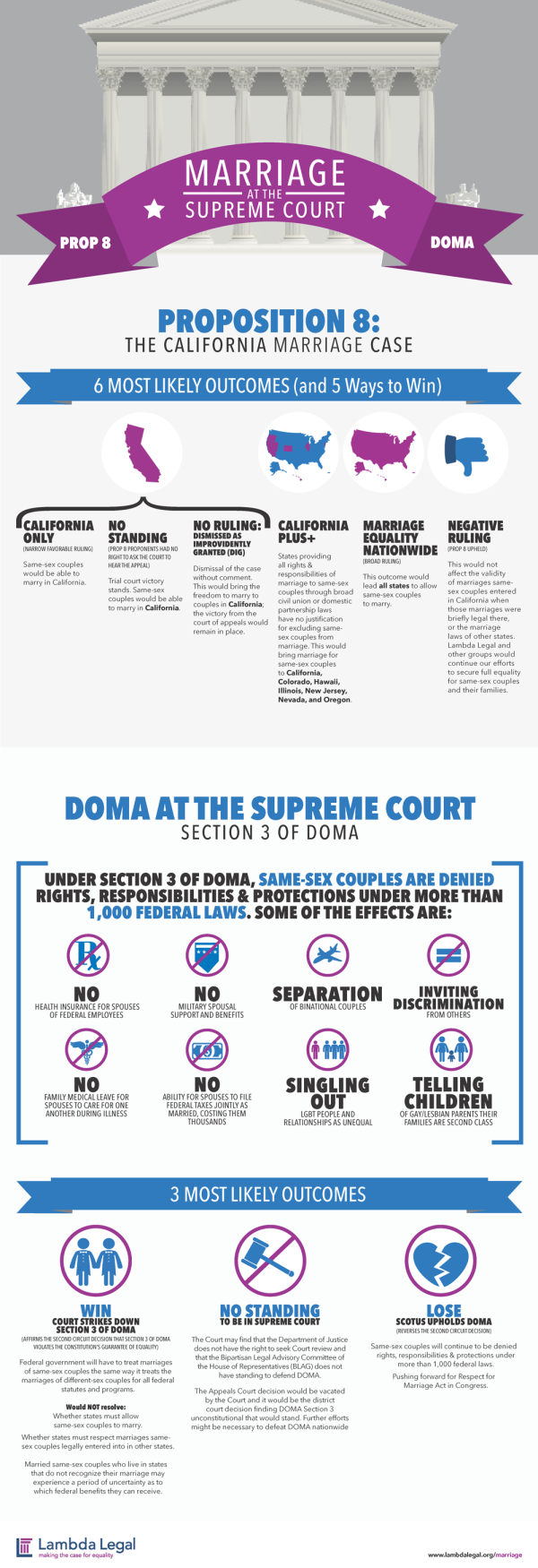
The ruling on DOMA does not legislate same-sex marriage, but it does mean that in states where same-sex marriage is already legal, the federal government will recognize those marriages in the same way that they recognize different-sex marriages. This decision has no bearing on whether same-sex marriage will be legal in individual states. The opinion was written by Justice Kennedy, with the supporting four votes coming from Ginsburg, Breyer, Sotomayor, and Kagan. Justice Scalia has dissented, along with justices Alito, Roberts and Thomas.
The no standing ruling in Prop 8 means that there will be no national impact on same-sex marriage rights because of this case, but that same-sex marriage should become legal in California. Essentially, the Supreme Court is saying that the people who appealed the striking down of Prop 8 don’t have legal legitimacy to make an appeal, and so the court isn’t really considering the case. Over at SCOTUSblog, there’s a discussion of what the next step for Prop 8 might be. Here’s the SCOTUS liveblog’s take on what just happened with Prop 8, according to Amy Howe:
After the two same-sex couples filed their challenge to Proposition 8 in federal court in California, the California government officials who would normally have defended the law in court, declined to do so. So the proponents of Proposition 8 stepped in to defend the law, and the California Supreme Court (in response to a request by the lower court) ruled that they could do so under state law. But today the Supreme Court held that the proponents do not have the legal right to defend the law in court. As a result, it held, the decision by the U.S. Court of Appeals for the Ninth Circuit, the intermediate appellate court, has no legal force, and it sent the case back to that court with instructions for it to dismiss the case.
Pro-Gay AND Pro-Immigration? You’re Stuck Between A Rock And A Hard Place
Today, the Senate Judiciary Committee began considering amendments to that sweeping immigration reform bill the Gang of Eight have been working on for months behind closed doors. As it stands now, the bill, which is called the “Border Security, Economic Opportunity, and Immigration Modernization Act” and is 844 pages long, aims to provide a pathway to citizenship for current undocumented immigrants, to tighten border security and employment verification, and to revamp the existing visa system. It was drafted by a bipartisan powerhouse — four Democratic and four Republican senators, led by Chuck Schumer (D-N.Y.) and including conservative up-and-comer Mario Rubio (R-Fla.), who have vowed to push it through no matter what, and with good reason — America hasn’t passed an immigration bill since 1986, when the country was a very different place. Approximately zero Americans oppose immigration reform, even if it’s tough to find consensus on what, exactly, that reform should look like.
But now is when the “what” part of “no matter what” comes in, and things get trickier. Judiciary Committee senators have filed over 300 amendments, which the committee as a whole will look over in the next two weeks. These amendments range from small tweaks (like requiring candidates for legal status to prove they’ve paid back taxes) to huge impossible performance-art-type statements (like Ted Cruz’s (R-Tex.) bid to basically deport everyone). Two of them, both introduced by Senator (and Judiciary Committee Chair) Patrick Leahy (D-Vt.), would specifically use the Act to extend the rights of binational same-sex couples and their families. Although this is already the norm in more civilized countries like Canada and Great Britain, it’s proving to be a controversial position in today’s America, where the Republican House somehow gains strength from strangling everything good.
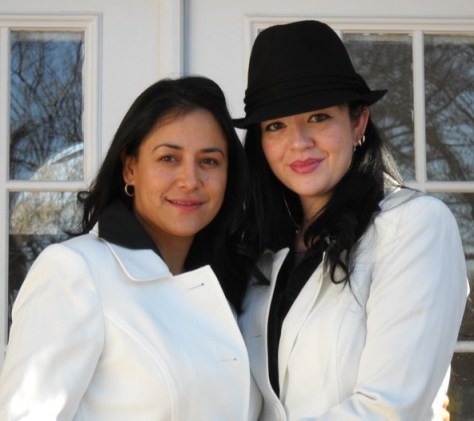
SUJEY & VIOLETA PANDO, A BINATIONAL COUPLE FROM DENVER, HAVE REPEATEDLY FACED DEPORTATION. THEY HAVE MATCHING TATTOOS. {VIA THE DOMA PROJECT}
Under current American law, as long as one member of a married heterosexual couple is a US citizen, his or her foreign-born spouse can petition for a green card. But because this is a federal right, and because the Defense of Marriage Act prevents the federal government from recognizing gay marriages, binational gay couples — even legally married ones — aren’t invited to the green card party. An estimated 40,000 couples are affected by this inequality. Amendment Leahy-6, which is basically the “Uniting American Families Act” Leahy has been championing for several months, would fix it by extending the same green card petitioning rights to commited same-sex couples, even unmarried ones, by creating a “permanent partners” category. Eligibility for this category would be determined by a set of criteria presented in the bill — couples must “intend a lifelong commitment” and be “financially interdependent,” among other things. (This itself presents potential problems when you consider that couples are probably less likely to dive into either of those things when one of them could be deported at any moment, but I digress.)
Amendment Leahy-7 is a little tricker — it would make it so that a person is considered married under the Immigration Act as long as the marriage “is valid in the state [or country] in which it was entered into.” Basically, in order to be eligible for immigration rights, you just have to go to the nearest state on this map and get hitched, and then, immigration-wise, you’re hitched wherever. If this amendment passes, it will provide the first ever workaround for DOMA (and it would invalidate Amendment Leahy-6 in the process). Lawyers and gay rights activists have described it as “brilliant” and “a strategic masterstroke,” as it will make it difficult for anyone to argue logically against it — as Human Rights Campaign vice president Fred Sainz puts it, “it’s hard to object to marriage if they’re already married.”
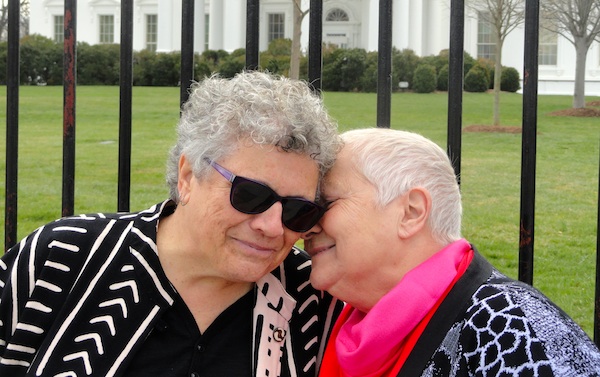
JUDY RICKARD & KARIN BOGLIOLO, A BINATIONAL COUPLE FROM CALIFORNIA, HAVE LIVED FOR STINTS IN EUROPE WHEN THE US KICKS BOGLIOLO OUT. IT IS KEEPING THEM FROM HAVING A GARDEN.
Predictably, though, a lot of people are all set to object anyway. Religious groups, including the Southern Baptist Church, the National Association of Evangelicals, and the US Conference of Catholic Bishops, have made it clear that they’ll pull their support from the bill if the gay marriage gets “tangled up” in it, because it is the “wrong place at the wrong time” to deal with this “divisive distraction” (their words, if you didn’t guess). Mario Rubio has said multiple times that he does not personally support the amendment, and thinks it will make his Republican colleagues reluctant to pass the bill. Some of these colleagues, including John McCain (R-Ariz.) and Jeff Flake (R-Ariz.), are all too happy to prove his point (McCain: “Which is more important, LGBT or border security? I’ll tell you what my priorities are.“). Compounding the problem, some think, is the fact that Obama supports the provision (in his own level-headed-to-a-fault way) — in our current weirdo political climate, the best way to get Republicans to vote against something is to give it the Obama stamp of approval.
And so LGBT-friendly senators (and those of us who vote them in, toss them money, and cold-call their interns) are faced with a classic dilemma. Do we consider this amendment a make-or-break part of immigration reform? Do we hold fast to the conviction that the “comprehensive” bill everyone keeps talking about must include all citizens, including gay ones, in order to live up to the word? In doing so, do we risk another legislative gridlock like the one that recently made the renewal of the Violence Against Women Act such a depressing experience?

NESS AND GINGER MADEIROS, A BINATIONAL COUPLE FROM MINNEAPOLIS, TOOK THEIR EIGHT-MONTH-OLD “TINY LOBBYIST” TO WASHINGTON TO FIGHT FOR GAY IMMIGRATION {VIA NEW YORK TIMES}
Or do we, as columnist Gabriel Arana argues we should, “take one for the team” and sacrifice the rights of gay couples in order to ensure that the broader legislation goes through? After all, if DOMA is repealed, as it might be this term, the whole issue quickly becomes moot (“Ultimately, recognition for LGBT couples is part of the marriage fight, not the immigration fight,” Arana argues. “[That] broader fight is well underway, and we’re winning.”). Meanwhile, there are about 267,000 undocumented queer immigrants waiting for this bill to go through so they can come out of what amounts to a terrifying and dangerous legal closet. Would this count as setting a horrible precedent and buying into the anti-intersectionalist idea, expressed by some, that gay people are somehow a “less valuable” constituency? Would we be voting ourselves into second-class status? Or just being politically savvy? Is it a copout to spend my energy, instead, planning for a future where those two are never related at all?
DOMA Goes to the Supreme Court, and Its Days May Be Numbered
Today, the Supreme Court listened to arguments on the Defense of Marriage Act, the federal law which defines marriage as being between one man and one woman. The buildup to this moment has been slow and intense – Obama first declared part of DOMA unconstitutional (Section 3, the part which explicitly refuses to recognize same-sex marriages as legal) back in 2011, and since then others, like Bill Clinton, who actually signed the act into law in 1996, have come to agree. Many Democrats in Congress agree. Unfortunately, none of those people are tasked with the job of actually what is and isn’t consitutional; that’s what the Supreme Court does, which is why the fact that the Court is looking at it this week is such a big deal.
When the ruling on Prop 8 comes, it will talk about whether it’s okay for an individual state to ban same-sex marriage, and may have national implications or may just be restricted to California. In contrast, the ruling on DOMA will decide whether the federal government of the United State is legally obligated to recognize same-sex marriages if they were performed in a state which allows them. Right now, even legally married same-sex couples can’t file tax returns together and are listed as “single” on census forms. Even though DADT has been repealed, servicemembers’ spouses can’t receive full benefits because they aren’t federally recognized as being married; the same thing happens with spouses of federal government employees. If DOMA is repealed, states won’t be forced to legalize or recognize same-sex marriages, but the government will recognize those marriages performed in states where it is legal.
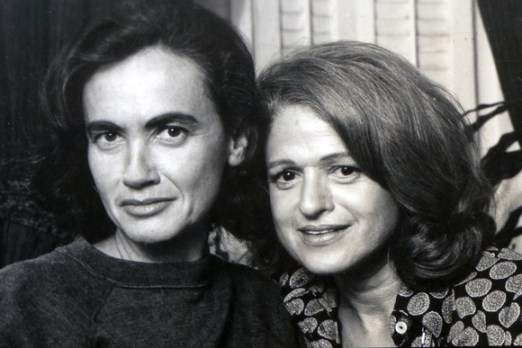
edie windsor, plaintiff in the DOMA lawsuit United States v. Windsor, pictured with her wife thea spyer
While the general impression of many after the arguments on Prop 8 yesterday was that the future of Prop 8 couldn’t be determined one way or another, there seemed to be something more of a consensus about the proceedings today on DOMA. As Reuters puts it, “a majority of Supreme Court justices on Wednesday indicated they could be inclined to strike down a law that denies federal benefits to legally married same-sex couples.”
Of course, since the court isn’t going to give us a ruling until June, everything in the media today is just pure speculation. It’s based on justice’s behavior in the courtroom, and how their doubt or skepticism about certain arguments is indicated by their questions to the legal team. Some justices asked questions which might be viewed as betraying their opinion on the issue, like when Justice Sotomayor asked “What gives the federal government the right to be concerned at all about what the definition of marriage is?” In addition to Sotomayor, Justices Kagan, Ginsburg, and Breyer are described as having “raised concerns” about the constitutionality of DOMA. Justice Kennedy, who usually rules conservatively, has been thought of as the wild card on this issue, since he’s voted supportively on gay issues a few times in the past. Today, Kennedy did seem skeptical of DOMA’s constitutionality, although his reservations may have been based more in his views on states’ rights than marriage equality:
Kennedy repeatedly said the states, not the federal government, have the primary role in deciding who is married. The question is “whether the federal government has the authority to regulate marriage,” he said.
The question of whether the justices consider DOMA an issue of equal rights for individuals or of states’ rights is important; if the final ruling strikes down DOMA, but treats the issue as a violation of states’ rights, then its impact could simply be that the federal government doesn’t have the right to define marriage, whereas for marriage equality supporters the ideal would be for the ruling on DOMA to say that it’s unconstitutional to deny all couples equal access to the institution of marriage. Justices Kagan, Sotomayor, Ginsburg and Breyer seemed to tend more towards this line of reasoning.
The discussion in the courtroom touched on arguments that have been brought up around DOMA before – Paul Clement, the lawyer defending DOMA, argued that the point isn’t discrimination so much as “a uniform definition of marriage.” Justices such as Sotomayor and Kagan pointed out that DOMA actually makes marriage less uniform, since “New York’s married couples [who may be gay] are different than Nebraska’s.” Kagan also pointed out that before DOMA, the understanding that “persons who are married in the state are married under federal law,” and in that respect also the current system seems less than perfectly uniform. Some more conservative justices, like Scalia and Roberts, expressed an opinion that (especially with the recent landslide of political support) gays and lesbians aren’t actually discriminated against, which is no real surprise given their past views.
One of the less expected topics that came up during arguments was the peculiar legal situation surrounding DOMA currently. As things stand, DOMA is part of the federal law of the United States, but the current president has declared part of it unconstitutional and refused to defend it in court (although at the same time, it has not yet been successfully repealed). Despite the president’s feelings on the matter, another part of the government (namely, John Boehner and the House of Representatives) feel that it’s inappropriate to stop defending the law, and so have hired a lawyer (Paul Clement, the lawyer in the courtoom today) in defiance of the president and are continuing to defend the law’s existence through him. In this sense, the Supreme Court is acting a little like a mediating body between two divorcing partners who are still living in the same house and sharing resources, but fundamentally disagree on everything. Given that this is a country we’re talking about, it’s an admittedly unusual situation. The conservative justices raised some eyebrows at this plan, with Justice Roberts intimating that Obama’s actions meant he lacked “the courage of his convictions.”
There are nine seats on the Supreme Court bench, and so five justices would be required to agree to strike down DOMA in order for a pro-equality ruling. It seems – again, based purely on speculation, as there’s no way of knowing for sure – that Justices Sotomayor, Kagan, Ginsburg, Breyer and Kennedy are unconvinced of DOMA’s constitutionality and may want to strike it down. That’s five justices, which would be enough for an anti-DOMA ruling. However, even if that were to pass, DOMA could still be struck down as a states’ rights violation rather than an equal access violation, which would be much less meaningful in terms of actually achieving marriage equality and not just removing DOMA. To listen to and/or read the arguments yourself and draw your own conclusions about what the justices may be thinking, you can find complete audio and transcript of the arguments at the NYT.
Rulings on both Prop 8 and DOMA are expected in late June; neither case is a slam dunk, and both cases have a variety of different ways they could play out even if marriage equality “wins,” some of which are much less beneficial to gay families than others. Although there have been some encouraging signs from within the court both today and yesterday – Edie Windsor and her lawyer left the courthouse today saying it “went well” and that Edie “felt respected” – we’re not going to know for sure what the outcome is for these cases for another few months. We can spend the time until then doing the same unflagging activism and work for change that got us to this moment, both for the cause of marriage equality and for the other issues, like job discrimination, housing discrimination, suicide, access to medical care, homelessness, and violence, which continue to threaten the safety and security of the queer community. Things are changing, but only because we’re making them, and this is no time to stop.
Same-Sex Military Couples Will Now Receive (Some) Benefits
Secretary of Defense Leon Panetta has announced that the Pentagon will start providing some benefits to same-sex couples in the military. According to Out-Serve SLDN, the benefits that will be extended all fall under the Family Well-Being category, and include the following:
- Hospital Visitation* (extended by member designation)
- Commissary Privileges* (extended via ID cards)
- Exchange Privileges* (extended by via ID cards)
- Morale/Welfare/Recreation (MWR) Programs* (extended via ID cards)
- Surveys of Military Families (extended via DEERS)
- Quadrennial Quality of Life Review (extended via DEERS)
- Emergency Leave*
- Emergency Leave of Absence
Child and Youth Programs
- Youth Sponsorship Programs*
- Youth Programs*
- Child Care*
Family Support
- Family Readiness Groups (extended by member designation)
- Family Center Programs* (extended via ID cards)
- Identification Cards*
- Sexual Assault Counseling Program
- Joint Duty Assignments
- Exemption from Hostile-Fire Areas
- Legal Assistance
Travel and Transportation
- Space-Available (Space-A) Travel on DoD Aircraft* (extended via ID card)
- Transportation to and from Certain Places of Employment and Military Installations* (extended via ID card)
- Transportation to and from Primary and Secondary School for Minor Dependents* (extended via ID card)
Survivor and Death Benefits
- Authority of Service Secretary to Transport remains of Dependent*
- Disability and Death Compensation for Dependents of Service Members Held as Captives*
- Continued Payments to Dependents of Service Members listed as Missing Persons
* Indicates that the benefit would also be available to the children of same-sex spouses

via Shutterstock
The Pentagon hopes to extend these benefits by August 1st, but has committed to extending them by no later than October 1st, 2013. They also do a remarkable amount of realizing that not all states recognize domestic partnership or equal marriage, so they erase that location privilege by requiring same-sex couples to sign a military-created document called a “Declaration of Domestic Partnership” rather than relying on the current legal status of a same-sex couple’s relationship.
You may notice a few huge somethings missing from that above list, though. There are so, so many benefits that the military is legally unable to extend to same-sex military couples because they are blocked by the Defense of Marriage Act (DOMA). Things such as medical and dental care, command sponsored visas to accompany service members stationed abroad and survivor benefits.
This has been hailed as the Pentagon going just about as far as it could possibly go with DOMA still in place. Allyson Robinson, Out-Serve’s executive director, is quoted in Queerty:
“Secretary Panetta’s decision today answers the call President Obama issued in his inaugural address to complete our nation’s journey toward equality, acknowledging the equal service and equal sacrifice of our gay and lesbian service members and their families,” Robinson said. “We thank him for getting us a few steps closer to full equality – steps that will substantively improve the quality of life of gay and lesbian military families.”
And Defense Secretary Panetta acknowledges the artificial ceiling that DOMA puts on his and the military’s options in the matter:
Additional benefits, such as health care and housing allowances, are by statute currently only available to spouses and therefore cannot be made available to same-sex domestic partners of Service members under current law. In the event that the Defense of Marriage Act is no longer applicable to the Department of Defense, it will be the policy of the Department to construe the words “spouse” and “marriage” without regard to sexual orientation, and married couples, irrespective of sexual orientation, and their dependents, will be granted full military benefits.
It seems that Leon Panetta and the Department of Defense have dispensed this information with the authority and efficiency of the U.S. military, just as they handled and continue to handle the repeal of Don’t Ask Don’t Tell. It’s something to get psyched about – baby steps. And hopefully seeing this kind of statement from the U.S. Department of Defense will be enough to support the repeal of DOMA, which is being heard by the Supreme Court this year in the form of U.S. v. Windsor. Even with people in power constantly coming to the defense of the LGBT population and marriage equality, it’s been a little tough for me to personally get psyched about this development because the military needs to drastically overhaul the way they care for all their personnel and veterans. Take, for example, the article in Esquire about the sniper who killed Osama bin Laden who now has basically nothing to show for his sixteen years in the military, not even a job. And that kind of overhaul in benefits and care for everyone, it just seems like such a daunting task. There are so many baby steps there that sometimes it’s hard to remember to just put one foot in front of the other.
In the meantime, if you’re one of the service members affected by this huge news, you can learn more by going to the handy Out-Serve FAQ. Out-Serve SLDN is the “association of actively serving LGBT military personnel and is a non-partisan, non-profit, legal services, watchdog and policy organization dedicated to bringing about full LGBT equality to America’s military and ending all forms of discrimination and harassment of military personnel on the basis of sexual orientation and gender identity.”
Obama Wants Same-Sex Immigration Reform, Congress Prefers to Just Argue About It Forever
Yesterday, President Obama made the commonsense yet somehow still controversial announcement that when it comes to immigration, it’s important that “the United States treat same-sex couples the same as other families, meaning that people would be able to use their relationship as a basis to obtain a visa.” As a Canadian, I find it ridiculous that binational American same-sex couples still don’t have the same immigration rights as heterosexual ones. Under the Family Class of the Canadian Immigration System, a person has been able to sponsor a spouse, common-law, or conjugal partner for immigration without regard to the gender of his or her partner since 2002. Even in the UK, where same-sex marriage is still not legal, the border agency states that “the requirements and process for applying as an unmarried or same-sex partner are the same as those for a [heterosexual] partner but the documents you must provide will be different.” Australia became one of the first countries to consider a same-sex relationship as a valid reason for migration all the way back in 1985. You’d think Congress would be embarrassed to be lagging behind on this human rights issue, and would therefore want to utilize basic kindergarden skills such as cooperation and teamwork to get Obama’s same-sex couple immigration reforms made into law as soon as possible. Unfortunately, working together is not one of the strong-suits of the bipartisan government, and Congress, as usual, is divided.
Trying to understand why it’ll be such a struggle for Obama to pass immigration reform is confusing when right now, here in Canada, it’s hard to keep up with the speed at which the government is turning bills into laws. It seems every morning I wake up to an “exciting,” brand-new legal change to the country: No health care for refugees! No Navigable Waters Protection Act! Goodbye Native American treaty rights! Meanwhile in the U.S., Obama’s bills crawl slowly through the House and the Senate, dreaming of and praying for the day when they’ll be able to be real, grown-up laws! While Harper manufactures dozens of bills into laws at once, effectively ruining Canada with the efficiency of a top-rate assembly line, Obama’s ideas to improve America are endlessly debated, critiqued, poked and prodded. I’m not saying this is a bad thing. Canada could certainly benefit from stepping back and slowing down; but it does make me wonder how long Americans separated from their same-sex foreign spouses will have to wait before they get some pretty basic human rights met.
Why is it so difficult to get a bill passed that would allow families to stay together and allow the US to retain residents who can contribute valuable things to the country? Well, although Democrats hold the Senate, the Senate immigration group, which is made of Republicans and Democrats has proposed immigration reform that, unlike Obama’s proposal, does not recognize the immigration rights of same-sex partners. However, some individual Democrat lawmakers are in favour of those rights and are telling American gay rights groups that binational same-sex couples will be included in a final draft of the immigration bill.
Unfortunately, good-old Republican John McCain, also a part of the Senate immigration group, is saying that this whole business of some Democrats wanting to give gay couples rights is a “red flag” and means bad things for the country. Most politicians in the Senate immigration group believe that before there is immigration reform, there needs to be additional border security and improved tracking of illegal immigrants. It wants to require immigrants who may be in the country illegally “to register with the government, pass criminal and national security background checks, pay fees and penalties as well as back taxes, and wait until existing immigration backlogs are cleared before getting in line for green cards.” Meanwhile in the White House, Obama wonders how long doing all of that is going to take. He doesn’t want to wait for the so-called perfect conditions set by the Senate immigration group before passing immigration reform. He said that the Senate’s pathway to immigration is too long, complicated, and out of reach for many people: “We all agree that these men and women have to earn their way to citizenship. But for comprehensive immigration reform to work, it must make clear from the outset that there is a pathway to citizenship.” If congress keeps on arguing over immigration, Obama has declared he will just write his own bill and insist that it’s voted on right away. Of course, with a government so divided, there’s no guarantee that it’ll pass.
And even if it is passed, it’s unclear how it will interact with the DOMA. As Olga explains in “Immigration Reform is a Queer & Trans* Human Rights Issue,” DOMA prevents cisgender, same-sex partners from sponsoring one-another for marriage-based immigration. Also,
“…domestic partnerships and civil unions are also not recognized. Perversely, the ban also excludes the spouses of queer refugees who have been resettled to the U.S. as a direct result of fleeing persecution based on sexual orientation.”
DOMA is currently being challenged in the Supreme Court and by the proposed Uniting American Families Act (UAFA) which would allow same-sex couples to side-step DOMA. Strangely, even though Obama has spoken out for same-sex immigration rights, it doesn’t seem like he’s including the UAFA, or anything similar, in his immigration reform plan. Is this because he doesn’t need to? If passed, will his immigration reform plan render DOMA obsolete? If America has two laws which contradict one another, which one gets to win?
The concept that same-sex couples shouldn’t have to go through something as life-altering as deportation when their straight counterparts are exempt from it seems like a no-brainer, especially when the President and the Department of Justice have acknowledged that Section 3 of DOMA is unconstitutional. But equal rights for gay couples and immigration reform have proven to be two of the issues that Republicans are most unwilling to compromise on, and progress on the combination of the two issues has proven truly Sisyphean in terms of how incremental and unsatisfying it feels to those impacted by it. There’s no way to be sure that this will be the time it works; that Congress will be able to agree on something, that the politicians who have promised to have Americans’ backs in later drafts will come through, or in the event that those things don’t occur, that Obama’s solution will be preferable or even able to pass. But it’s a comforting step forward that this issue has reached the level of national conversation, and with the momentum granted by a second-term president who doesn’t have to secure votes for a future election, we can at least think about hoping that this might be a moment of real change.
Paul Clement’s New Pro-DOMA Argument Is The Last Thing You’d Expect
Paul Clement, the lawyer that the Republicans in the House of Representatives hired to continue defending DOMA even after one of its sections was declared unconstitutional by the Department of Justice, has never been particularly creative. The brief that he and John Boehner filed back in 2011 on the Edie Windsor case is a good example of what he’s brought to the DOMA issue so far. It contains arguments everyone has already heard: anti-gay discrimination isn’t important enough to warrant heightened judicial scrutiny; gays make bad parents; sexual orientation isn’t fixed or inherent and is therefore invalid; homophobia just isn’t really that big a deal anymore because I mean, have you seen Will and Grace? In short, Clement hasn’t been able to bring anything new to the table as a lawyer representing the anti-gay side, and has mostly relied on the same old arguments that have failed to stand up to a judge or a test of basic logic. That is, until now.
This week, Clement stated that marriage needs to be legally limited to the union between one man and one woman because gays are in fact more responsible parents than straights, who can “produce unplanned and unintended offspring.” In fact, he went so far as to describe unmarried straight couples as a “very real threat” to American society. Charles Cooper, who you may remember fondly from the Prop 8 trials, added that “It is plainly reasonable for California to maintain a unique institution [referring to marriage] to address the unique challenges posed by the unique procreative potential of sexual relationships between men and women.”
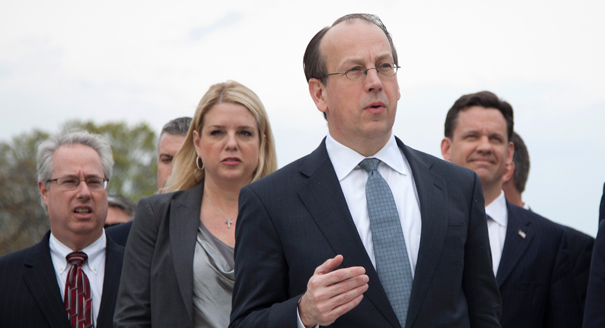
In a shocking turn of events, there’s nothing homophobic about the anti-equality side’s argument, if only because it’s an argument that doesn’t address or include gay people at all. While not homophobic, the argument is totally speculative; it doesn’t rely on any research or data that confirms its fears about unmarried straight couples are in fact harmful to anyone. This might be in part because Clement himself, in the same 2011 brief, once critiqued his opponent’s claim that gay parents are just as good as straight parents by writing “Plaintiff’s claim of a clear expert consensus is overstated. Indeed, the evidence relied upon by Plaintiff’s own expert demonstrates that studies comparing gay or lesbian parents to heterosexual parents have serious flaws.” So Clement’s bizarre critique of straight parents (and reminder that straight people could accidentally become parents at any moment!) can’t be based on actual studies, and has to instead be based on the unpredictable possibilities of heterosexual sex. In contrast, the fact that same-sex couples can’t have procreative sex is somehow no longer a mark that we’re marked unfit for families by God, but a marker of being prudent and responsible; we need “substantial advance planning” to have families.
There are plenty of flaws with this plan, most notably that while (within its own system of logic) Clement’s argument calls for straight marriage, it fails to explain why marriage needs to then be limited to straight people. Even if straight people do “need” marriage, it doesn’t follow that gay people who want marriage should then be denied it. It also relies upon the assumption that children are necessarily better off with married parents, so much so that people who could potentially have children should get married as a safeguard against it, as well as ignoring the children that are born of sexual contact that doesn’t occur within a relationship. Perhaps most obviously, it’s a dramatic reversal of everything conservative defenders of “traditional marriage” have believed for decades, although no new information is cited in the change of opinion. Essentially, it’s a pretty ludicrous argument to make.
But as ludicrous as it is, it has one important thing going for it — it’s totally new, and hasn’t been seen in the hallowed halls of anti-gay argumentation before. This doesn’t mean it will be effective, necessarily, but it does mean that Clement – and perhaps others – have realized that the old arguments will be totally ineffective. The conservatives have lost faith in their ability to win with spurious anti-gay claims; even the nuttiest of nutjobs can no longer convince themselves that telling a judge that gay moms are evil, or that gay people aren’t really gay, will work. Which is a pretty amazing victory, and which means that we have reason to hope for real victory on DOMA.
What Judicial Dreams May Come: What the Supreme Court Ruling on Prop 8 and DOMA Could Mean
Two cases. Five issues. Nine Justices. Infinite possibilities.
Okay. Perhaps infinite is a bit of an exaggeration. But with the Supreme Court’s announcement last Friday that it will hear two petitions affecting the future of marriage equality, the universe of possibilities is terrifyingly immense.
Some basic context: As a visitor of this site, you’ve probably at least casually encountered the two issues that have been bubbling up through the courts: Proposition 8 and the Defense of Marriage Act (DOMA). (If, per chance, you’ve missed it, we have a post or two to get you up to speed.)
Last Friday, the Supreme Court granted two petitions: in Hollingsworth v. Perry, the Supreme Court agreed to consider whether the Equal Protection clause prohibits California from restricting the definition of marriage to the union of one man and one woman. In U.S. v. Windsor, the Supreme Court agreed to consider whether Section 3 of DOMA is unconstitutional, as applied to same-sex couples married under the laws of their states.
However, in accepting these petitions, the Court added some questions of its own. In the Prop 8 case, the Court asked the parties to brief and argue whether petitioners have standing – that is, whether the proponents of Proposition 8 have a right to be in the courtroom. (Recall that, when Governor Schwarzenegger declined to appeal the ruling of the trial court, the proponents of Proposition 8 asked to intervene and essentially stand in for the Governor to continue defending the initiative. The Supreme Court is asking both sides to explain why this is or is not constitutionally permissible.)
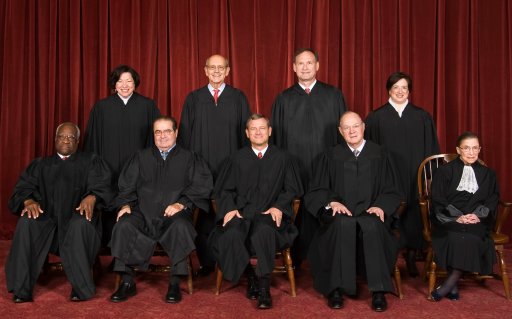
The Process
In the DOMA case, the Court asked the parties to brief and argue whether the fact that Obama’s Department of Justice agrees with the lower court that DOMA is unconstitutional means that the Court has no jurisdiction in this case. Additionally, the Court asked the parties to address whether the Bipartisan Legal Advisory Group (John Boehner’s friends) has standing.
These issues combined get at fundamental constitutional issues. The Federal Courts can only hear cases where there is an actual case and controversy – if we all agree on the outcome, there isn’t a controversy for the court to decide. In arguing that DOMA is constitutional, BLAG has presented a controversy, but much like with Proposition 8, it isn’t clear that they are constitutionally permitted to do so.
So what does this mean? Why should you care? As a practical matter, raising the procedural issues of standing gives the Justices the option to avoid ruling on the merits of the case. As Professor Nan Hunter so eloquently stated, “Escape hatch, thy name is standing..”
Instead of deciding that Proposition 8 deprived people in California of their fundamental right to marry, the Court could instead conclude that it need not reach the merits of the case, because no one who wanted to challenge the original ruling had the authority to do so. We’d revert to Judge Walker’s ruling – but it would only be binding on the parties to the case – including Los Angeles County and Alameda County. As a practical matter, this would likely result in marriage equality throughout the State of California, but not anywhere else. Instead of deciding that DOMA is un/constitutional based upon the current case, the Court could determine that the petitioners in this case don’t have standing, and wait until next term to take up a different DOMA case. In that case, we’d probably have a decision in 2014 (at the earliest).
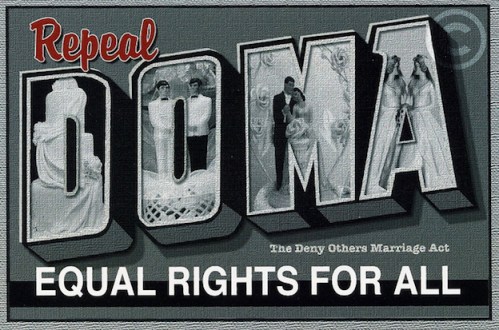
The Substance
However, even presuming that five Justices can agree that the petitioners in each case have standing and the Court is constitutionally permitted to hear these cases, there are degrees of winning and losing. We might win. We might even win big. But if we get to the merits of the cases, we might also lose in a terrible way – and we need to be prepared.
If we reach the merits, the DOMA case is pretty straightforward. As far as I can tell, there isn’t any middle ground on the merits. If five justices conclude that this section of DOMA is unconstitutional (as applied to people in states that provide for marriage equality), DOMA Section 3 falls, and with it, the federal definition of marriage as one man and one woman disappears. All married folks in Massachusetts can file their taxes together, and All federal employees in Maryland can add their spouses to their insurance policies. This is a giant step in the right direction, and likely a palatable option for at least five Justices.
Despite my personal optimism though, there is another option on the merits. If five Justices agree that Section 3 of DOMA is constitutional – it stands. We will continue to have a federal definition of marriage and it will exclude our families until Congress decides to repeal the law. Which will probably take a while. Of course, this is just the status quo – but it is the status quo minus the optimism that comes with the possibility of relief from an unjust system.
With Proposition 8, though, there are more options. As Professor Kenji Yoshino has persuasively argued, we have at least four potential outcomes (in addition to the previously noted escape hatch).
1. A clear statement that there is no fundamental right to marriage equality. This would be devastating. The mere threat of this outcome kept many of our leading advocacy organizations from supporting this sort of litigation right up until the point that Olson and Boise filed the Prop 8 case. (Once the litigation started, everyone fell in line. There’s no sense in arguing against the desired outcome, even if one questions the wisdom of pursuing that outcome at a given time). Certainly, the climate has changed since the Prop 8 litigation started; notably, we’ve started winning things. However, the possibility of a broad, sweeping anti-equality determination remains. If this happens, we will find no relief from the federal courts for years to come, and we will have to continue to fight these battles one by one at the state level.
2. In issuing the determination at the appellate court level, the Ninth Circuit set up a clear alternative argument for the Supreme Court’s consideration: there is a right to marriage equality in the specific case of California, where same-sex couples had the right to marry before this right was taken away through Proposition 8. As Judge Reinhardt noted at the time, to reach a determination in this case, it was not necessary to determine whether same-sex couples may ever be denied the right to marry, because the facts were more limited.
The Court could continue this line of logic, and this would still count as a win. Same-sex couples in California would be allowed to marry, and such a ruling would leave open the possibility of future litigation in other states, under other circumstances. We could still get to nationwide marriage equality across the country through the courts in the future. However, it would be a more limited win than many of us are hoping to secure.
3. Professor Yoshino has presented a third alternative, which hasn’t gotten as much media attention, but presents middle ground between full marriage equality in all of the States and a decision limited to California. Yoshino argues that the Supreme Court might find that it is unconstitutional to grant all of the rights and privileges of marriages while withholding the name, because “once the state has given same-sex couples the rights and responsibilities of marriage, it cannot justify withholding the word “marriage.” He terms this “the eight state solution,”because such a ruling would require eight additional states to grant full marriage equality, those which are currently in a state that might be called “everything but the word ‘marriage”’ (California, Delaware, Hawaii, Illinois, Nevada, New Jersey, Oregon, and Rhode Island). This is a more promising outcome. It expands the number of states allowing same-sex couples to marry, and it leaves open the possibility for future litigation that will continue to advance the cause. However, it also allows the Court to take an incremental approach to change, which might help to prevent any backlash that could come with a broader grant.
4. Of course, there remains the final option. The Supreme Court could take this opportunity to stand on the right side of history, and acknowledge, as it previously did in Loving v. Virginia, that “marriage is one of the ‘basic civil rights of man,’ fundamental to our very existence.” If the basic right to marriage is to mean anything, it must mean that everyone has the right to marry a person of his or her choosing, regardless of gender. The dream. (Admittedly, the incredibly unlikely dream. But anything can happen).
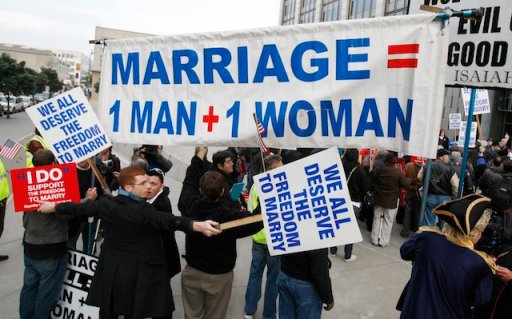
But for now, we can only speculate. In accordance with Supreme Court Rules, the petitioners have 45 days from last Friday to produce their briefs (written arguments), and the respondents have 30 days from the date of that filing to submit their responses. So, in about two and a half months, we’ll have a much better sense of the arguments each side finds most compelling. Oral arguments are expected at the end of March (though a date for the arguments has not yet been announced), and all signs point to an opinion in June 2013. For now, we wait. And hope.
BREAKING: Supreme Court Will Consider Both Prop 8 and DOMA
by Laura and Rachel
Last Friday, we reported the the Supreme Court declined to take action on any of the ten cases surrounding same-sex marriage that currently sit before them. As Rachel pointed out, these cases aren’t about the whether or not marriage equality is coming soon to a city hall near you. Instead, the Supreme Court makes a decision on each case which, in turn, has larger legal ramifications.
Of the ten cases currently petitioning SCOTUS for a writ of certiorari, eight address DOMA, one challenges Prop 8 and one disputes an Arizona law that restricts health benefits to legally married same-sex couples. Overturning DOMA would legalize same-sex marriage on a federal level but would not require states to perform such marriages. Invalidating California’s Prop 8 or Arizona’s health care law, on the other hand, would legalize same-sex marriage in their respective states and could open the door for more states to following but would have no effect on federal legislation.
The DOMA cases hoping to find their way to the Supreme Court docket are already fairly familiar. Three of the cases are appeals to May’s 1st circuit decision in Boston that found DOMA to be unconstitutional. Four challenge the 2nd circuit’s ruling in favor Edie Windsor. The last deals with the lawsuit that Karen Golinski filed after her employer, the federal government, denied her wife spousal health coverage.
As of today, the Supreme Court has announced that it will in fact take up the issue of same-sex marriage by reviewing BOTH Prop 8 and DOMA. This means that the Supreme Court will consider both the question of whether the federal government is obligated to consider same-sex marriage valid, and whether it’s constitutional to deny same-sex couples the right to marry.
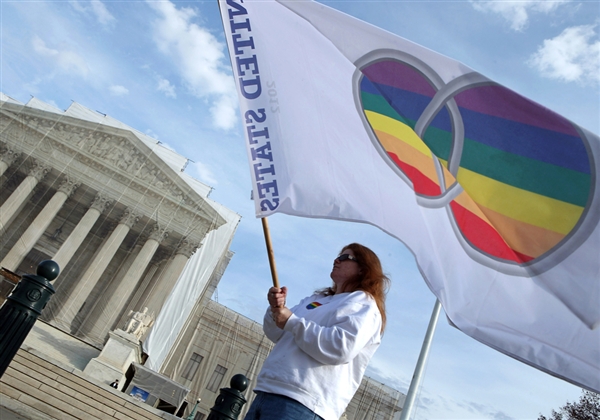
All We Do Is Win: Second Federal Appeals Court Strikes Down DOMA, Scores One for Gay Marriage
Today, the 2nd Circuit Court of Appeals in New York became the second appellate court in the nation to rule the Defense of Marriage Act unconstitutional. The decision comes on the heels of May’s 1st Circuit ruling against DOMA in Boston and pushes us one step closer to the Supreme Court.
A week after everyone’s favorite octogenarian lesbian, Edie Windsor, won her case in June, both the Bipartisan Legal Advocacy Group (BLAG) and – despite arguing in favor of Windsor’s lawsuit – the Department of Justice filed an appeal. Arguments before appellate judges Dennis Jacobs, Chester Straub and Christopher Droney began on September 27th and today, a 2 to 1 decision upheld the lower court’s ruling.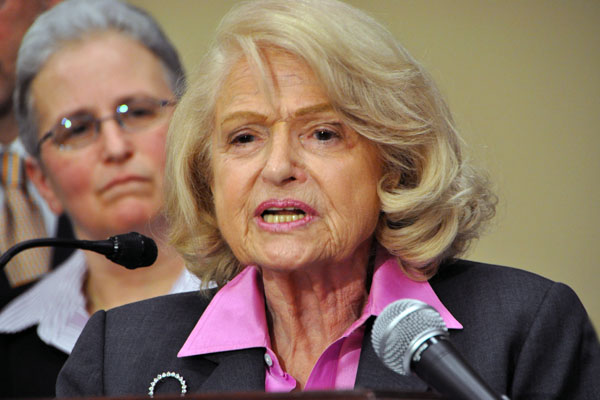
While the ruling has no immediate consequences for Windsor or other couples in the state, the majority opinion, written by George H.W. Bush-appointed, conservative Judge Jacobs, is groundbreaking. Unlike the Boston decision, which ruled against DOMA based on states’ rights, the court acknowledged the discriminatory nature of the law and was the first Federal Appeals Court to decide that a case regarding LBG people should be subject to heightened scrutiny. If you harken back to the judgement daze of Prop 8, you might remember just how much of the trial was spent attempting to prove or disprove that LGB people belong to a quasi-suspect class, which would decide whether the case would be subject to rational basis review or intermediate scrutiny. Our legal eagle Jessica did an amazing job explaining all the ins and outs of levels of review to you (and me), but the short version is that heightened scrutiny transfers the burden of persuasion from the plaintiff to the government.
Reading Jacob’s opinion is a validating experience. The arguments regarding LBG people as a quasi-suspect class ring true and include such gems as “But whether such discrimination existed in Babylon is neither here nor there.” It’s worth reading in whole, but to gloss over his breakdown of the case wouldn’t do story justice. “To withstand intermediate scrutiny,” the judge reminds us, “a classification must be ‘substantially related to an important government interest.'” Among the “important government interests” that BLAG provides are a desire to main a consistent definition of marriage, protect public funds, avoid “the unknown consequences of a novel redefinition of a foundational social institution” and push for responsible procreation. One by one, each point is shot down. If the government is so concerned about consistency, why aren’t there federal laws regarding divorce or age of consent? DOMA affects over a thousand federal laws; it would be impossible to argue that it’s solely concerned with public fiscal matters. Tradition is, in a word, bullshit – or at least not a legal concept. And as for incentives that encorage responsible procreation for heterosexual couples? Well, it turns out marriage equality doesn’t do anything to affect them.
DOMA’s classification of same-sex spouses was not substantially related to an important government interest. Accordingly, we hold that Section 3 of DOMA violates equal protection and is therefore unconstitutional.
Our straightforward legal analysis sidesteps the fair point that same-sex marriage is unknown to history and tradition. But law (federal or state) is not concerned with holy matrimony. Government deals with marriage as a civil status–however fundamental–and New York has elected to extend that status to same-sex couples. A state may enforce and dissolve a couple’s marriage, but it cannot sanctify or bless it. For that, the pair must go next door.
The dissent, written by Judge Straub, discusses his belief that the courts should not get involved in contentious matters and should instead leave them to a vote by the public.
Courts should not intervene where there is a robust political debate because doing so poisons the political well, imposing a destructive anti-majoritarian constitutional ruling on a vigorous debate.
It’s another victory for all of us who continue to fight for equality, yet we still have a long road ahead of us. Windsor’s petition the to Supreme Court is one of four currently waiting for review. It’s expected that the Court will hear at least one in the next year. With the presidential election on the horizon and the promise of one or more Justices to the victor, it’s uncertain what kind of climate such a case could encounter. For today, though Windsor’s thrilled with the outcome; “I know Thea would have been so proud to see how far we have come in our fight to be treated with dignity.”
New Guidelines Make Binational Gay Couple Deportation “Low Priority,” But Not “Non-Priority”
The Department of Homeland Security has now drafted up written guidelines for binational and immigrant same-sex couples and families to now be considered “low-priority” in deportation cases. In June 2011, the Department of Homeland Security “spelled out factors Immigration and Customs Enforcement officers should consider when deciding which immigration cases are classified as ‘low priority’ for removal.” One of the major factors includes family ties to a U.S. citizen. However, because the Defense of Marriage Act prohibits same-sex couples from being federally recognized as equal to married heterosexual couples, no one was completely sure if these new rules included same-sex partners. Hence the new guidelines and the good news.
“In an effort to make clear the definition of the phrase ‘family relationships,’ I have directed ICE to disseminate written guidance to the field that the interpretation of the phrase ‘family relationships’ includes long-term, same-sex partners,” Homeland Security Secretary Janet Napolitano wrote.
Rep. Nancy Pelosi and Rep. Jerrold Nadler, as well as 80 other members in Congress requested the written guidelines in an effort to make the “families of U.S. citizens” clause clearer.
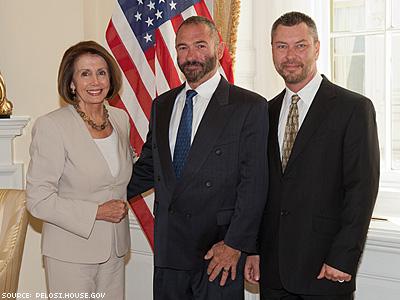
Nancy Pelosi with binational couple Bradford Wells and Anthony John Makk
via {The Advocate}
A national organization for gay, lesbian, and transgender immigration rights, Immigration Equality, is praising this change as a step in the right direction. They’re absolutely right, this is a great step, but it’s a small step. This “low-priority” status is only the tip of the iceberg when it comes to binational same-sex couple immigration.
Binational same-sex couples cannot be considered married for immigration purposes because of DOMA. U.S. citizens and permanent residents with same-sex partners or in same-sex marriages cannot sponsor their spouses for a partner visa, nor can same-sex partners accompany their spouses into the U.S. on the basis of a family or employment-based visa.
So, you can’t legally get into the United States based on the fact that your partner or spouse lives or works here. This new written Department of Homeland Security law doesn’t help with that. The new guidelines also don’t help if you leave the country and would like to return or if you’re interested in getting a job. This new guideline only protects you as an undocumented immigrant living with your partner or spouse in America, and it doesn’t give you rights. It just means Immigration and Customs Enforcement officers won’t come banging on your door. I suppose we could call that a small success, but there’s more to be done.
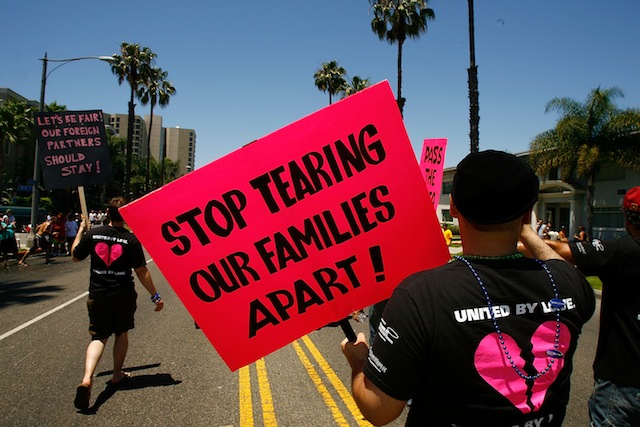
via {Jezabel}
Currently, there has been a bill introduced called the Uniting American Families Act. The Uniting American Families Act would allow U.S. citizens to sponsor their long-term same-sex partners or spouses just as heterosexual couples do. UAFA refers to same-sex couples as “permanent partners” which is pretty adorable, and outlines that permanent partners would have to be financially interdependent, neither party can be legally married to another person, and they must be unable to enter into a marriage under the U.S. Immigration and Nationality Act — the one that gives heterosexual couples the rights to sponsor their partners for a green card or visa into the United States.
The United States lags behind 19 countries that recognize same-sex couples for immigration purposes: Australia, Belgium, Brazil, Canada, Denmark, Finland, France, Germany, Iceland, Israel, the Netherlands, New Zealand, Norway, Portugal, South Africa, Spain, Sweden, Switzerland and the United Kingdom. None of these countries has reported fraud problems associated with its decision to allow immigration equality for its citizens.
When I was previously engaged to an Australian woman, this inequality of immigration rights took a huge toll on our relationship. There was only the option of living abroad with her or living in the United States without her. I’m not alone in this frustration. When speaking to a friend about her relationship with a South African woman, she said, “The research basically turns out to be ‘hope that her country likes you better!'” It’s great if your partner’s home country does allow same-sex couples to immigrate, but what about all of the countries that don’t? What happens then?
It’s easy to be pessimistic when it comes to small steps, but the only remedy is to continue to be involved and push for change, especially with the Uniting American Families Act. The bill has a large number of co-sponsors and may have a pretty good chance of getting passed. The best way to ensure this is to contact your local Congress members, a feat that Immigration Equality’s Action Fund makes quite easy.

